In Part 1 of this 2-part series, we discussed how prostate cancer is the second most common cancer affecting men, and the second leading cause of death from cancer in men. Fortunately, prostate cancer has a nearly 90% survival rate after being diagnosed.
Clearly, the key is to catch prostate cancer early and manage it well. However, how this should be done is hotly debated. For instance, the PSA test may not a reliable indicator of prostate cancer risk as was once believed.

An active, healthy lifestyle and proper nutrition are key contributors to a decreased risk of prostate cancer
In the meantime, a growing school of thought is beginning to subscribe to the theory that a healthy diet, proper nutrition, and an active, healthy lifestyle may help to lower prostate cancer risk factors significantly.
In Part 1, we considered vitamins D and E and their proposed role in prostate cancer risk. It seems that a deficiency of either of these two vitamins is associated with a greater risk of developing prostate cancer – or more aggressive forms of prostate cancer.
Preliminary research also suggests that modified citrus pectin (MCP) – a complex carbohydrate found in the peel and pulp of citrus fruit – may have protective effects against colon, lung, and prostate cancer.
Let’s look at the effect of various dietary components on prostate cancer risk factors.
The Impact of Diet on Prostate Cancer
An extensive review conducted by an expert panel on behalf of the World Cancer Research Fund and the American Institute for Cancer Research has shown clear links between specific foods and nutrients and prostate cancer risk.
For instance, foods that are rich in omega-3 fatty acids and lycopene protect against prostate cancer, as does a low-carbohydrate diet. Additionally, pulses (legumes), green tea, pomegranates, and high levels of vitamin D in the blood also lower prostate cancer risk.
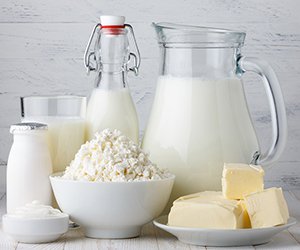
Excessive consumption of calcium through supplements or dairy foods is linked to an elevated prostate cancer risk
On the other hand, excess consumption of dairy or supplements containing calcium have been linked to an increased risk of prostate cancer.
Similarly, regular consumption of sugared beverages, refined, and processed foods is associated with a greater risk of prostate cancer.
Organically and locally grown, pesticide-free, and non-irradiated fruits and vegetables are rich sources of vitamins, minerals, and hundreds of healthful phytochemicals. Several epidemiologic studies have found that the more fruits and vegetables you eat, the lower your overall cancer risk as well as prostate cancer risk.
Specifically, cruciferous vegetables such as broccoli, cabbage, cauliflower, and allium vegetables such as garlic, leeks, chives, and shallots contain sulfurous phytochemicals (known as sulforaphanes) that enhance your immune system, along with blocking cell growth and inducing programmed cell death (apoptosis) in cancer cells.
For instance, broccoli contains a powerful sulforaphane. Research shows that men who eat broccoli show hundreds of beneficial changes in genes that are known to play a role in fighting cancer.
Allium vegetables also appear to protect against prostate cancer, although the data is limited at present. A randomized trial with 199 men found that a mix of pomegranate, green tea, broccoli, and turmeric significantly reduced the rate of rise in PSA protein in men with prostate cancer.
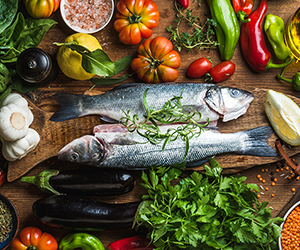
Adherence to the Mediterranean diet was shown to reduce overall mortality rate by 22 percent in men already diagnosed with non-nonmetastatic
prostate cancer
The so-called “Mediterranean diet” – long associated with longevity as well as lower cardiovascular and cancer mortality – contains many foods that lower the risk of prostate cancer. Compared with western European countries, Greece has lower prostate cancer mortality. Consumption of a traditional Mediterranean diet may be responsible for lowering their risk.
A clear link exists between obesity and higher prostate cancer risk, along with a higher risk of metastasis and death among obese people who develop prostate cancer.
Next, let’s take a closer look at some dietary components and their role in prostate cancer risk.
Do Carbohydrates Have an Impact on Prostate Cancer Risk Factors?
Some experts believe that high levels of insulin promote prostate cancer. So, it makes sense that reducing carbohydrate intake – especially foods with a high glycemic index (GI) – to control your insulin levels can also help to lower your prostate cancer risk.
(Note: The GI is a number associated with a food that indicates the food’s effect on blood glucose (also known as blood sugar) levels. A value of 100 represents the standard, equal to an equivalent amount of pure glucose. The GI represents the rise in a person’s blood sugar level following consumption of a particular food and is useful for understanding how the body breaks down different carbohydrates during digestion.)

A high intake of refined carbohydrates (e.g. bread, cakes, and candy) has been shown to increase risk of prostate cancer
In animal models, both a zero-carbohydrate diet and a low-carbohydrate diet (both low GI) were seen to slow prostate tumor growth. In human studies, high intake of refined carbohydrates (high GI) was associated with increased risk of prostate cancer.
To lower your risk of prostate cancer, nutrition experts recommend consuming controlled quantities of complex carbohydrates rich in dietary fiber, which are low to medium GI and also usually contain many of the vitamins and minerals your body needs to remain healthy and disease-free. Some examples of good complex carbs include pumpkin, butternut squash, sweet potato, plantain, quinoa, brown rice, bananas, organic sweet corn.
Replacing junk food in your diet with quality complex carbohydrates can help to improve insulin, cholesterol, and blood pressure regulation.
Stay away, however, from refined grains that are stripped of the fiber- and nutrient-rich bran and germ portions of the seed. Foods made with refined grains (such as those found in many breakfast cereals) are typically very poor both in terms of fiber content and nutrition.
A recent study shows that regular consumption of refined foods and sugared beverages was linked to a three-fold greater risk of prostate cancer, while higher intake of processed foods including pizza, burgers, and meat sandwiches doubled prostate cancer risk.
Above all, be sure to completely avoid or minimize your consumption of overly refined and processed foods, including sweets, cakes, pies, doughnuts, and all artificially sweetened foods and beverages. Refined foods and sugary drinks triple the risk of prostate cancer.
Lower Prostate Cancer Risk with Omega-3 Fats
Omega-3 fatty acids are polyunsaturated fats, or PUFAs. They include the shorter chain alphalinolenic acid (ALA) and the more important longer chain eicosapentaenoic acid (EPA) and docosahexaenoic acid (DHA).
We obtain ALA when we consume plants and plant oils – specifically walnuts, edible seeds, clary sage seed oil, algal oil, flaxseeds and flaxseed oil, Sacha Inchi oil, Echium oil, and hemp oil.
Far richer dietary sources for EPA and DHA include oily fish such as cod liver, herring, mackerel, wild salmon, and sardine. Fish oils, egg oil, squid oils, and krill oil, as well as various edible seaweed and phytoplankton are also good sources.
Also, we can make the long-chain omega-3 PUFAs – EPA and DHA – from the shorter-chain ALA in our bodies, although the ability to do this may become impaired with age.
Laboratory experiments on cell lines and animal studies suggest that omega-3s lower overall cancer risk by suppressing inflammation, inducing programmed cell death (apoptosis), and preventing the formation of new blood vessels that fuel tumor growth.
Omega-3 PUFAs have been shown to slow the growth of prostate cancer cells in the laboratory. Further, higher consumption of omega-3s has been linked to a lower rate of death from all causes among men with non-metastatic prostate cancer in the Health Professionals Follow-up study.
In a study of 48 men with prostate cancer, a repeat biopsy in six months showed that eicosapentaenoic acid (EPA) supplementation prevents prostate cancer progression.
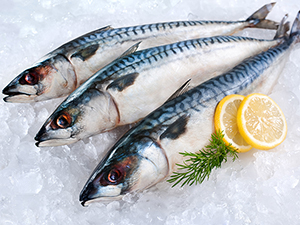
In general, regular consumption of omega-3 fats from fish lowers fatal prostate cancer risk
A low-fat diet with omega-3 PUFA supplementation four to six weeks prior to radical prostatectomy (a surgical procedure to remove part of or all of the prostate gland) reduced prostate cancer cell proliferation and cell cycle progression. In general, regular consumption of omega-3 PUFAs from fish lowers fatal prostate cancer risk. However, more research is needed to understand the exact role of the amount and type of total fat and different fatty acids in prostate cancer risk.
The Calcium Connection with Prostate Cancer
Increased consumption of dairy products has been shown to nearly double the risk of prostate cancer. Calcium is one of the primary ingredients in dairy products. It is also the most abundant mineral in the human body and is considered essential for life.
Up to 99% of the body’s calcium is stored in bones and teeth, to support their structure and function. Your bones undergo continuous remodeling, with constant “resorption” (leaching of calcium out of bone) and deposition of calcium into new bone. However, calcium levels in the blood are very tightly controlled and do not fluctuate with dietary intake.
Milk, yogurt, and cheese are rich natural sources of calcium. Non-dairy sources include Chinese cabbage, kale, and broccoli. Spinach contains calcium, but unfortunately our bodies are not able to absorb a lot of it. Most grains, cereals, some fruit juices and drinks, and tofu are fortified with calcium.
So, what is the connection between calcium consumption and prostate cancer?
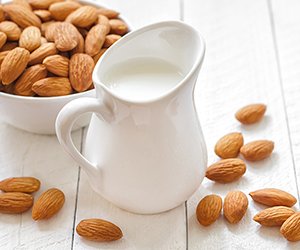
In one study, almond milk slowed the growth of prostate cancer cells, while cow’s milk caused the cancer cells to grow faster
In an eye-opening 2011 study, prostate cancer cells were treated with cow milk, almond milk, soy milk, casein, or lactose in a laboratory setting. Amazingly, prostate cancer cells treated with cow milk grew faster! Soy milk did not affect the growth of prostate cancer cells, while almond milk actually slowed the growth of prostate cancer cells.
Another study in 2012 looked at the consequences of consuming different doses of vitamin D and calcium in mice containing human prostate cancer cells. Interestingly, prostate cancer cells grew fastest in mice that received normal calcium and no vitamin D at all, relative to other diets. In other words, vitamin D deficiency in the presence of calcium appears to help prostate cancer cells grow better.
Several epidemiological studies have found an association between high consumption of calcium or dairy foods or both, and an increased risk of prostate cancer in men.
(Note: Epidemiology is the study and analysis of the patterns, causes, and effects of health and disease conditions in specific populations.)
Specifically, studies of dairy products, dietary calcium, and prostate cancer risk indicate that high total calcium consumption is linked to a greater risk of advanced and metastatic prostate cancer. For example, a 2015 review of 32 studies found that consuming lots of milk, low-fat milk, cheese, total dietary calcium, and dairy calcium was linked to a greater prostate cancer risk.
Interestingly, in this same review, calcium supplements and non-dairy calcium were not linked with an increased risk of developing prostate cancer. Instead, calcium supplements seemed to increase the risk of dying from prostate cancer that was already present.
Overall, consuming more than 1,500–2,000 mg of total calcium daily seems to be responsible for increased prostate cancer risk, especially advanced and metastatic cancer, when compared with consuming 500–1,000 mg daily.
Daily doses of more than 1,000 mg have also been associated with a higher risk of cardiovascular disease and death.
The Benefits of Green Tea
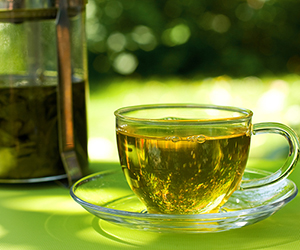
Drinking 2-3 cups of green tea daily will likely provide positive health benefits
After water, tea is the most widely consumed beverage in the world. Traditionally made from the leaves of the Camellia sinensis plant, many studies suggest that green tea lowers prostate cancer risk.
For instance, prostate cancer mortality rates are the lowest in Asian countries where per capita consumption of green tea is high. Not only that, but prostate cancer risk also rises in Asian men who migrate to the U.S. and abandon their traditional dietary habits.
In laboratory experiments, green tea and green tea extracts have been shown to stop cancer cells from growing, and even kill them – along with preventing the formation and growth of new blood vessels in tumors, depriving them of essential nutrients.
The cancer-fighting properties of green tea are believed to be because of the presence of bioactive green tea polyphenols known as catechins. Epigallocatechin-3-gallate (EGCG) is the main catechin, making up 50-75% of the total catechins in green tea.
The beneficial effects of green tea may be due to EGCG’s ability to block the actions of male hormones (known as androgens) on their receptor proteins in prostate cancer cells. This slows their spread and increases the rate at which they die. Preventing the activation of the androgen receptor is a successful approach to treating prostate cancer, so green tea is likely to be useful as a future therapy for this disease.
EGCG also lowers the activity of enzymes known as histone deacetylases in prostate cancer cells, which also contributes to their death. In fact, EGCG treatment has been shown to change the expression of up to 40 genes in prostate cancer cells.
One potential problem with these laboratory studies is the high doses of tea polyphenols used to treat prostate cancer cells. We may need to drink seven to nine cups of green tea or more to achieve equivalent levels of EGCG in our blood, which is unlikely to be tolerated well by our digestive system.
However, drinking such a lot of green tea may not be necessary to take advantage of its protective effects. Taking two or three cups daily (or more, depending on your preference) of a quality green tea should still provide significant desired health benefits.
Studies in mice show that treatment with green tea catechins mimicking daily consumption of 6 cups of green tea delays the development of prostate tumors. In another study, mice having human prostate cancer cells that were treated daily with EGCG showed clear reductions in tumor volume and lower blood PSA levels, suggesting that EGCG could potentially be used to treat patients with advanced prostate cancer.
Moving on to human studies… in an Italian study, 60 men diagnosed with high-grade PIN were randomly assigned to receive green tea catechin capsules (600 mg daily) or a placebo every day for an entire year.
(Note: Prostatic intraepithelial neoplasia (PIN) is a condition in which prostate gland cells become somewhat abnormal, but still don’t look like prostate cancer cells under a microscope. High-grade PIN is considered to be a pre-cancer of the prostate because it is likely to turn into prostate cancer over time.)
After six months, six of the 30 men in the placebo group were diagnosed with prostate cancer, relative to none in the green tea catechin group. After one year, nine men in the placebo group, but only one man in the green tea catechin group were diagnosed with prostate cancer.
These findings clearly show that green tea catechins can help to prevent prostate cancer in people who are at high risk for the disease – and that this protective effect is long-lasting.
So far, all the evidence strongly indicates that green tea consumption is the most beneficial in men diagnosed with early PIN lesions, men who are at high risk of developing prostate cancer, and men who are undergoing so-called “watchful waiting.”
(Note: Watchful waiting is the term used to describe closely watching a patient’s condition without giving treatment, unless symptoms appear or change. This approach is typically used in conditions that progress slowly – such as prostate cancer – especially when the risks of treatment are believed to be greater than the potential benefits.)
However, green tea appears to have limited or no benefits in patients who are already suffering from advanced prostate cancer – especially if the cancer has already metastasized or migrated to other parts of the body.
Because of its promising anti-cancer activity, many human clinical trials have been carried out – and are ongoing – to conclusively find out whether EGCG and green tea extract supplements can help to protect against the onset of prostate cancer. In the meantime, you can safely drink two to three cups (or more, depending on your preference) of green tea daily to help lower your risk of developing prostate cancer, usually without any serious side effects.
Please note that if you are sensitive to caffeine or on prescription medications, you should first consult your physician before adding green tea to your diet.
Learn to Love Lycopene
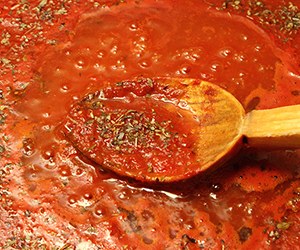
Cooked tomatoes have even higher levels of lycopene than raw tomatoes
Lycopene is a carotenoid, a natural pigment found in pink and red fruits and vegetables such as apricots, guavas, watermelons, pink grapefruit, red carrots, red bell peppers, and tomatoes.
In its natural state lycopene helps to protect plants from light-induced stress and also helps them make nutrients using the sun’s energy. We cannot make lycopene ourselves, so we need to consume these colorful fruits and vegetables regularly to take full advantage of lycopene’s health benefits.
One common source of lycopene is from tomatoes and tomato-based products such as tomato paste and tomato puree. Good fats such as olive oil and butter help to increase the absorption of lycopene from food into our bodies. For example, cooking diced tomatoes with olive oil significantly increases lycopene absorption.
Lycopene acts as an antioxidant by countering harmful “free radicals” in our body.
(Note: A free radical is a highly reactive molecule that damages important biological structures in our body’s cells, such as DNA and proteins. Antioxidants limit the damage free radicals cause by neutralizing them.)
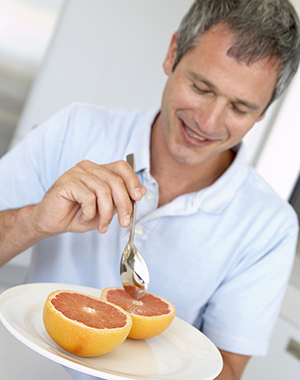
In addition to tomatoes, other sources of lycopene include pink grapefruit, watermelon, apricots, guava, red bell peppers, and red cabbage
Multiple studies show that lycopene consumption helps to prevent prostate, lung, and stomach cancers. Not only that, but lycopene consumption may also lower the risk of cardiovascular disease and stroke.
So how does lycopene consumption affect prostate cancer risk factors? In the laboratory, treating human prostate cancer cells with lycopene “arrested” them in their cell cycles – specifically, it stopped them from growing by blocking the expression of a protein known as cyclin D1. The more lycopene, the better it worked. Scientific evidence now suggests lycopene can block cancer cell growth at multiple stages in their growth cycle.
Epidemiological studies have shown that men who consume high amounts of dietary lycopene have a lower risk of prostate cancer. For instance, a 2004 meta-analysis found a small positive effect of tomato products on reduction of prostate cancer risk. The Health Professionals Follow-Up study indicated that lycopene in tomatoes helps to lower prostate cancer risk, specifically by affecting the formation and growth of new blood vessels that normally fuel tumor growth.
The National Cancer Institute’s Prostate, Lung, Colorectal, and Ovarian (PLCO) Cancer Screening Trial looked at the association between lycopene consumption and prostate cancer risk. It found that increased lycopene consumption was linked to lower prostate cancer risk, but only among men who had a family history of prostate cancer.
Another study looked at prostate cancer progression in 40 patients with high-grade prostate intraepithelial neoplasia (PIN). Twenty of these men were given lycopene twice a day, while the remaining 20 were given no lycopene supplementation over a period of two years. Those patients treated with lycopene supplements showed a greater reduction in their blood PSA levels.
Not only that, adenocarcinomas were diagnosed in 6 out of the 20 patients who had not received the supplements, but only in 2 out of the 20 patients who had received lycopene. Clearly, lycopene may be an effective tool for preventing high-grade PIN from progressing to prostate cancer.
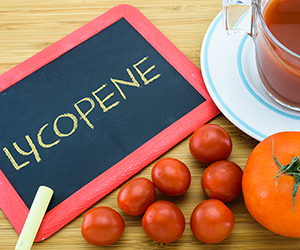
Numerous large studies have examined the connection between lycopene and prostate cancer risk
In another study, patients with localized prostate cancer who were given lycopene supplements twice daily for 3 weeks prior to prostatectomy had smaller tumors and lower serum PSA levels.
To add this healthful phytochemical in your diet, simply consume tomatoes and tomato-based products such as tomato puree, spaghetti sauce, tomato soup, salsa, ketchup, and tomato paste – which are all much more concentrated sources of lycopene than fresh tomatoes!
However, these products typically also contain high levels of salt, sugar, and preservatives, making them a lot less healthy than consuming fresh organic tomatoes.
As mentioned above, cooking tomatoes and other lycopene-rich foods in olive oil and butter helps to increase lycopene absorption. Health experts recommend that to make the most of lycopene’s anti-cancer benefits, you should consume between 5,000 to 10,000 micrograms of lycopene daily, obtained from organic food sources.
Higher daily doses have been shown to cause diarrhea, nausea, and vomiting, bloating, gas, and gut irritation. So the best approach you can take is to include many different varieties of fresh or canned unadulterated, non-irradiated tomatoes and other lycopene-containing organic fruits and vegetables in your meals and salads as often as you can. Besides lycopene, other phytochemicals in these foods may also be contributing anti-cancer health benefits.
Pomegranate: The Prostate Cancer Preventer
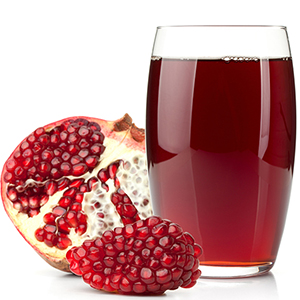
Only use fresh pomegranate juice made from the actual fruit, not processed pomegranate-flavored “drinks”
Originally from the region that is now modern-day Iran, the pomegranate is cultivated widely throughout the world nowadays.
This deep red fruit is chock-full of beneficial bioactive compounds known as phytochemicals. The most abundant phytochemicals in pomegranate are polyphenols including the ellagitannins, which are also found in walnuts. The red color of the fruit juice is because of natural pigments known as anthocyanins.
Plants, flowers, and fruits use pigmentation to protect themselves from harmful UV radiation from the sun and other environmental stressors. So, when we consume plant foods containing pigments such as anthocyanins, they also help us to deal better with stress, radiation, and environmental toxins.
Compared to the edible pulp, the inedible pomegranate peel contains three times as many beneficial polyphenols and is used to make dietary supplements.
In a 2004 laboratory study, cold-pressed pomegranate oil, carbon dioxide-extracted seed oil, and juice and peel polyphenols – all of these prevented the growth of different prostate cancer cell lines. These effects were caused by changes in how these cancer cells grew as well as by the induction of apoptosis, or programmed cell death.
In another study, mice containing prostate cancer tumors were given pomegranate seed oil, peel polyphenols, or saline (0.9% salt solution). Mice given pomegranate extracts had significantly smaller tumor volumes relative to mice injected with saline. The first clinical trial of pomegranate juice in men with prostate cancer showed that, on average, study participants who drank the juice had an increase in their prostate-specific antigen (PSA) doubling time, from 15 months before treatment to 54 months after treatment. In other words, their increase in PSA levels was slowed down nearly 4-fold.
Currently, further clinical trials are being carried out on the effects of pomegranate-extract pill, pomegranate juice, and pomegranate liquid extract for the treatment of prostate cancer.
To benefit from the anti-cancer benefits of the pomegranate, simply consume the fruit on its own or in fruit and vegetable salads. Fresh-pressed juice from organic, non-irradiated pomegranates is also hugely beneficial, not only for prostate cancer risk but also for cardiovascular health.
Conclusion
In Part 1, you learned that a deficiency in either vitamin D or E is associated with a greater risk of developing prostate cancer, or more aggressive forms of prostate cancer. You also learned that the precise connection between blood levels of these two vitamins is not fully understood.
Current research also supports that Modified citrus pectin (MCP) may help to protect against colon, lung, and prostate cancer by inducing so-called “programmed cell death” or apoptosis, and by interfering with metastasis (migration of cancer cells from the original area to other parts of the body).
In this article, we’ve covered the importance of eliminating simple carbohydrates and refined grains (think foods with sugar and flour) and replacing them with healthy complex carbohydrates.
You’ve learned the importance of consuming adequate levels of omega-3 fats, while being cautious with calcium and dairy.
When it comes to foods that men should consider adding into their diets… 2 to 3 cups of green tea daily, along with foods rich in lycopene, and pomegranate all appear to reduce prostate cancer risk factors.
Article Summary
Excess consumption of dairy or supplements containing calcium has been shown to nearly double the risk of prostate cancer.
Research shows that men who eat broccoli show hundreds of beneficial changes in genes that are known to play a role in fighting cancer.
In human studies, high intake of refined carbohydrates (high GI foods) was associated with increased risk of prostate cancer.
In general, regular consumption of omega-3 PUFAs from fish lowers fatal prostate cancer risk.
In laboratory experiments, green tea and green tea extracts have been shown to stop cancer cells from growing, and even kill them.
Lycopene acts as an antioxidant by countering harmful “free radicals” in the body and helps to prevent prostate, lung, and stomach cancers.
To benefit from the anti-cancer benefits of pomegranate, consume the fruit on its own or in fruit and vegetable salads.



















Eliminating dairy products to stave off prostate cancer in men is a double edge sword. It has been proven that dairy products helps to build strong bones. I have had bone density tests which enables me , a female, to keep this important to my life and others. If men who enjoy dairy products, such as my husband, it is very beneficial to his welfare for strong bones. We also eat fish at least 1X a week along with chicken, turkey etc. to maintain a good diet. Thus, I do feel, and my doctors know, that this makes for a healthy maintenance of our diet.
Please look into the dairy industry properly and their lies, the high protein content in milk actually leaches calcium from our bones and is why western countries with the highest dairy consumption have the highest osteoporosis rates also…. we were lied to…
100% true Zoe. Take dairy at your own risk!
In addition, all dairy products that we eat are No Fat, which further points to the healthy diet.
There are two types of calcium. One is eliminated in urine and the other thru the bowels, which is better for avoiding kidney stones. Is this a factor in prostate cancer?
I take Protandim which is super for getting rid of free radicals. It makes the body produce anti- oxidant and toxin removing enzymes which are way better then any food or supplement.
Good article. I like that all of the recommendations are based on actual studies. I would also like to see each reference footnoted with the links to the studies or the journal citations.
The effectiveness of tomatoes and tomato-based food can be increased by eating cruciferous vegetables at the same meal. Combining broccoli (or similar vegetable) with tomato helps to make both foods more powerfully anti-cancer than either one eaten alone. This synergy was studied at the Univ. of Illinois on a grant from the American Institute for Cancer Research several years ago but has not been widely incorporated into standard anti-cancer dietary advice.
On the effect of dairy on prostate cancer we can note that the insulin-like growth factor found in dairy can help to induce prostate cancer and to spread it. As a growth factor it helps cancer grow.
Thanks loads, this piece is knowledge packed, I appreciate!
Does this apply to raw dairy products?
I was wondering the same thing.
It would be helpful to know how many die from prostate cancer who HAVEN’T been treated with pharmaceuticals, radiation and surgery versus those who HAVE. From my readings on the subject, getting medical treatment for nearly any form of cancer greatly increases the risk of dying. I think far too many deaths are attributed to cancer when the real cause of death is from the treatments themselves.
I was diagnosed with adenocarcinoma of prostate at a relatively young age 55yrs. My Gleason score was 7(3+4).
I underwent Radical Prostectomy in the year 2003. After surgery, biopsy revealed 8 lymph nodes out of which1 was found to be positive. Ever since I am under treatment ( Hormonal therapy ). My PSA last tested was 0.8. I am leading a very normal & happy life. During the initial years(8) my Wife used to give me Wheat grass juice prepared at home on an empty stomach. The juice worked wonders & gave me lots of energy. I owe gratitude to my family, doctors and Blessings of the Almighty.
I buy a 1/2 gal. of organic milk, from grass fed cows, every two weeks. I make keffer from the milk and consume about 4 oz per day and have about 4 to 6 oz on an organic whole grain granola once a week. My question is, does the furmenting process used to make the keffer change the way the calciun is absorbed?
Our bodies don’t need dairy … at all, it leaches calcium from our bones and fuses mucus build up in the body…. use coconut mylk for your probiotic instead 😉
More the reason to avoid processed foods/ Food acids, citric acid are premeditated with calcium
Can cbc oils shrink prostate tumors? I have 4th stage prostate cancer and it has metastasized. They gave me 1 year and so far it’s been 1 and half year. My psa is.19. On hormone shots which are awful, but better than the alternative! Any hope for me?
Hi Ken,
We are sorry to hear about what you are going through. We cannot provide you with medical advice, so the best advice we can give you is to consult with one of the doctors/experts that we interviewed in our Global Quest Series. Here is a link to get their information: https://thetruthaboutcancer.com/experts-info-sheet/
Check out the Castilo Clinic in Tejuana
Salam. God Bless you, so you are talking about the milk in general even the raw milk? please reply. Thank you for time.
Besides genetics, the growth factors in cows’ milk cause calves to grow several times faster than human babies do on their mothers’ milk. Getting huge oversupply of those growth factors into adult, non growing body prone to cancer seems to be worse than just the calcium. Elaborate on this to save us (the readers) many ass hours needed to search for and read the relevant materials.
When discussing milk as a cause of cancer, are you talking about raw milk or are you talking about pasteurized low fat milk?
Please provide links to studies that show milk causes cancer.
Le Yaourt est-il également à éviter à l’instar des produits laitiers en général ?
There is a book called, ‘Your life in your Hands’ by professor Jane Plant which appears to show a link between dairy and cancer
The only type of dairy product which I like is just Cheddar cheese. I do not care about the other cheeses very much except for putting them on top of pasta and pizza. I barely drink milk except for use it in my cereal and porridge and I never eat yoghurt and barely use whipping cream.
We appreciate this information, as my husband has a psa of 7 and is supposed to be deciding whether to have radiation and surgery. No radiation, EVER.
He takes many immune important nutraceuticals also gets much sun since he is an arborist, and long distance cyclist, snowboarder, skiier.
I’d like to know what effect consuming alcohol has on Prostate cancer, thank you.
Taxifolin (biodihydroquercetin) as high antioxidant helps to prevent and treat prostate cancer .
This dairy discussion is interesting, however, in common with the folks at the Weston A. Price Foundation, I have a hard time appreciating any dietary advice that reflects against what we would have consumed traditionally, dairy & dairy products included.
Honestly, until you clarify what kind of dairy you are referring to- grass fed vs. grain fed/conventional (including even most organic from CAFO dairies), pasteurized vs. raw, even A2A2 vs. non A2A2, industrially processed in any way (homogenized, low fat, etc.), vs either raw straight from your local farm or minimally processed as in homemade yogurt, sour cream, butter, etc. made by yourself or your local farmer- you really can’t have a very relevant discussion about the benefits or drawbacks of dairy, as the nutritional profile/absorbability/healthfulness in the various forms is “all over the map”. (The proper forms of dairy are great sources of vitamin D, for instance, while the wrong forms have about none.) Which means that until we know what form of dairy they were using in all these studies reflecting against its healthfulness, the said studies won’t tell us much.
And to make it even more complicated, did any of the studies implicating calcium in any form factor in the controlling effects or lack thereof of magnesium in the body? Lack of mag is a major issue also, & will affect what calcium does or doesn’t do.
100% all dairy is not created equal. I think this is the study you’re asking about: https://ods.od.nih.gov/factsheets/Calcium-HealthProfessional/
There’s a link at the bottom of the article titled “Sources/references” that should help answer your questions.
Could not agree more!